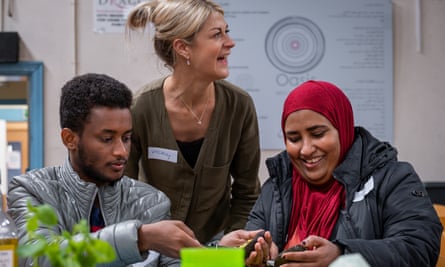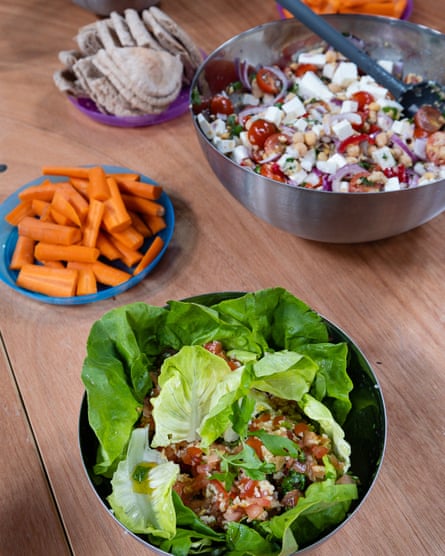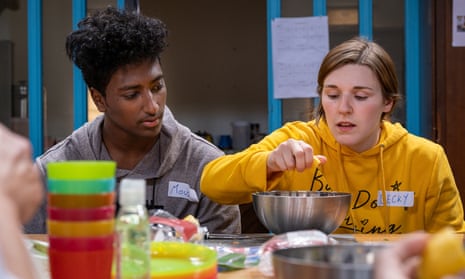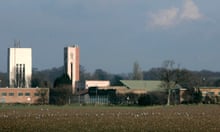On a recent Sunday, in a large hall in St Alban’s church in Birmingham, a group of immigrants from Iran, Turkey and Iraq sit for lunch with volunteers from a charity called Local Welcome. As locals cheer the annual Vélo Birmingham & Midlands cycle ride, the refugees are collected from their hostel. On arrival at the church, they are met by Sunday worshippers. The refugees and local volunteers are then organised into three groups to make large helpings of salad, tabbouleh and potato rostis. At one table, where Local Welcome volunteers and refugees dice tomatoes and onions for the tabbouleh, the men and women talk about their favourite food, hobbies and music.
Local Welcome is one of a growing number of nationwide charities and social enterprises that use food and cooking skills to help refugees to improve their English and to create local networks, so that they can contribute to British life.
A decade of austerity and government cuts to English language classes has left many refugees and immigrants feeling vulnerable and isolated. A new report by the charity Refugee Action has revealed that funding for English lessons for refugees and other immigrants has more than halved in the past 10 years – from around £212m in 2008 to £105m in 2018 – and that these cuts are related to increased feelings of isolation as well as difficulties in finding work.

Local Welcome launched in January with £512,000 in funding from the National Lottery Community Fund. Each month, volunteers are invited to visit a venue to prepare and eat lunch with refugees or immigrants. Volunteer leaders, who want to take charge of each meal, pay a monthly subscription of £5. Ordinary members pay £5 for each lunch they attend. The funds raised cover the cost of all the ingredients. Refugees and immigrants eat for free.
“We wanted to bring together not just people who are different, but people who are isolated, and give them a simple but fun and authentic experience in their local community,” says founder Ben Pollard.
Many people are unaware how immigrants navigate their daily challenges, such as learning a new language or networking. “We don’t always get to sit beside and speak with people who are going through the asylum-seeking process,” says Gerry Sykes, parish priest at St Alban’s church, where Local Welcome has held five lunches.
There are other projects around the country with a similar aim. At a supper club in Manchester called Heart & Parcel, migrant women improve their English while cooking and hosting food nights featuring cuisine from countries such as Bangladesh, Egypt and Syria. The emphasis on learning English helps counteract a drop in local funding for English courses.

The ability to cook and prepare food among strangers can unlock confidence and potential. Inside Crossway Christian Centre in London’s Elephant & Castle, a group of around 30 adults attend a weekly cooking class run by a social enterprise called Migrateful.
Many of the men and women who attend are unable to work because of their legal status. The classes help asylum seekers and refugees to improve their English and cooking skills, and there are also lessons in how to develop their CV for British employers and how to improve their interview techniques.
On a recent Tuesday morning, a group of men and women listen as founder Jess Thompson outlines future classes on public speaking. Afterwards they work in groups to cook Lebanese and Filipino food.
Selam Mengisto, 23, from Eritrea has been living in the UK for nearly two years and hopes to find a job in a restaurant after gaining a related qualification. “Because of the political situation in my country, I left Eritrea without anything. When I was coming through Europe, I learned a little about cooking food from Italy and France. When I first came to the UK, I always cooked for myself.”
“We realised that people who can cook can use it to achieve other goals,” says Thompson. “Many of the people we see have lost their confidence because they haven’t worked in a long time. Cooking offers them a way to improve language skills, make networks and find work. Not everyone wants to be a chef or work in a restaurant, but cooking can lead to new ideas. We also train them to share their stories, which gives them a sense of worth and healing.”
Migrateful runs a 10-week training programme for cooks who want to cater for events such as birthdays and parties. Thompson writes references to help refugees achieve qualifications and find jobs once they gain settled status. The enterprise, which launched in 2017, also organises pop-ups in restaurants across London, and alumni chefs from countries such as Iran and Ethiopia have been trained to run catering businesses and hold cooking classes for private clients.
Local groups specialising in food can also offer other skills. In Glasgow’s Victoria Road, near the city’s sprawling Queen’s Park, a coffee shop called MILK is also a social enterprise. Women from countries such as Eritrea and Afghanistan volunteer to help run the cafe. MILK, which launched in 2015, offers free art and sewing classes, hosts open-mic events and is a space for pop-up restaurants.
“Newcomers to this area can often find themselves isolated,” says Gaby Clunnes, MILK’s co-founder and co-director. “Without strong English skills, migrant women can struggle to find work and make the most of their skills. We wanted to find a space where they could both teach and learn new things, and meet people who could help them develop the contacts they need.”

Back at Migrateful’s class in Elephant & Castle, Awa Sammeh, from Gambia, makes a dish of yoghurt and shredded cucumber. Before arriving in the UK in 2012, she worked in the kitchen of a five-star hotel in Tunisia. She now works three days a week at a Lebanese restaurant in Chelsea.
“Classes like this are good for my self-confidence,” she says. “I feel like I am planning for my future by coming here. Before, if I went to an interview, I would be a little bit panicked because I felt my English was not always strong. But when I come here, we do an exercise about how to speak to other people. I learned how to introduce myself and convince people why they should hire me.”
Elizabeth Johnson from Nigeria explains how attending cooking classes helped her regain her confidence. Johnson has lived in the UK for nine years and was once homeless. She has attended Migrateful lessons for over a year and recently began working in the homelessness sector for charities such as Shelter.
“As a migrant and as an unsettled woman, I really had problems integrating in society,” she says. “I had lots of issues with my immigration. Coming here, I felt I was meeting with people and interacting and bonding. Cooking is a very good hobby of mine and this made my journey through integration much easier. I call this place my little United Nations. I have never met so many brothers and sisters from different parts of the world.”









